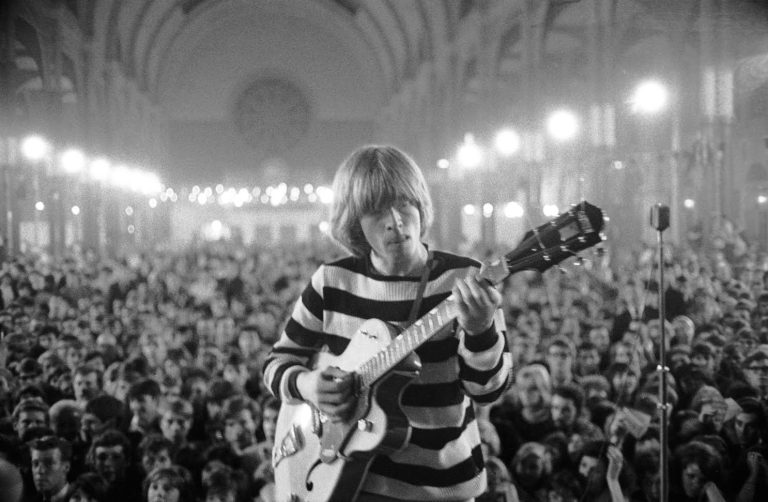It was in April 1962 that the decisive meeting for the future of rock took place, between Mick Jagger, Keith Richards and…Brian Jones.
In April 1962, Mick, Keith and Dick went to London to see a concert at the Ealing Club – in fact, the back room of a tea room rented to “trad” (traditional New Orleans) jazz groups – to listen to the first English white blues group, Blues Incorporated. The group, founded by Alexis Korner – guitarist for jazz trombonist Chris Barber – was one of the very first British groups to introduce American blues by performing a small set of “devil’s music” at the end of Barber’s shows.
At the end of 1961, Korner and a harmonica player, Cyril Davies, formed their own blues group and their sets at Ealing began to attract more and more people: the British blues scene was born. Among those who began frequenting the club – first as a spectator and then as musicians participating in the jam sessions – were all the future musicians who would make the British Blues Boom and who would later pursue international careers. Thus the guitarists will become regulars at Ealing Eric Clapton, Jeff Beck and Dave Davies, singers Eric Burdon, Paul Jones and Long John Baldry, saxophonist Dick Hextall-Smith, keyboardist Nicky Hopkins, bassist Jack Bruce or drummer Ginger Baker drummer.
It’s the drummer Charlie Watts who officiates behind the barrels the day Jagger, Richards and Taylor venture to Ealing. Although a good musician, Watts did not attract their attention. On the other hand, a young blond guitarist answering the no of Elmo Lewis stands out with his torrid version of “Dust My Blues” by guitarist Elmore James and his rereading of “Dust My Broom”. by Robert Johnson, After finishing, Jagger and Richards are introduced to the young musician whose nickname is made up of Lewis, his middle name, attached to Elmo, a form of homage to the guitar hero Elmore James. But he allows them to call him by his real name: Brian Jones.
Blues Crusade
Coming from an upper-middle-class family living in Cheltenham, a London suburb, Brian Jones, then 22, was subject to recurrent asthma attacks. Jones is a brilliant student – at one point it was thought he would attend medical school to become a dentist. But it was by learning to play the guitar that the blues began to take precedence over everything else. After meeting Korner in 1961, Brian regularly went to London to hang out at the musician’s house, where the scholar introduced him to the blues of Johnson and James – the latter’s music literally galvanized the young Jones: it was there that he decided to buy his first electric guitar.
He quickly begins to lead a bohemian life in an old building in the English capital, and earns money to pay for his food and rent by accepting odd jobs during the day, so that when night comes, he constantly listens to the blues. and meet the musicians of the then emerging R’n’B scene. When Mick and Keith meet him, Brian Jones is just starting his own group. In May 1962, he published an advertisement in the magazine Jazz-News : “guitarist and singer from an R&B band looking for harmonica player and/or tenor sax, piano, bass and drums. Ready to repeat. Guaranteed professional prospects. » Among those who responded to the advert, a pianist from Surrey named Ian Stewart stood out. Stu, as he was called, is a skilled blues and boogie woogie player. Following his audition, Brian immediately recruited him.
Meanwhile, Mick sends Alexis Korner a demo of some songs that he, Keith and Taylor recorded at home, hoping that Korner will let them play at the Ealing Club. What Korner will accept with grace, despite criticism from blues purists unimpressed by the particularly distorted sound which dominates the style of Richards, whose playing is notably influenced by Chuck Berry and his devastating riffs. On the other hand, Korner greatly appreciates Mick – as much for his way of singing, his freshness as for his looks. Korner finds that Jagger has a supernatural talent for adopting all the vocal techniques of blues and R’n’B singers: from Muddy Waters to Slim Harpo. The guitarist, by recruiting a charismatic and rather handsome young singer, also sees a chance to make his group, Blues Incorporated, much more popular. So he asks Mick to join him.
“Rollin’ Stone”
It was while joining Blues Incorporated that Mick Jagger became friends with Charlie Watts. Born in June 1941, Watts is a jazz enthusiast who taught himself to play drums by listening to American jazz records – Max Roach and Art Blakey in particular. However, he was then destined for an artistic career, after taking courses at the Harrow School of Art. He quickly left this institute to work as a graphic designer and created posters for an advertising agency. Charlie plays as a dilettante in various jazz groups on the weekends until the day Korner asks him to join Blues Incorporated. Although Watts doubts that his very jazzy playing could be easily integrated into a blues group, he nevertheless accepts this proposal… But, with caution, he continues to work as a graphic designer.
The other consequence of Jagger’s arrival in Blues Incorporated will be the dissolution of Little Boy Blue and the Boys Blue – which will push Richards towards the group that Brian Jones is just starting. Keith and Brian are guitarists with complementary playing skills who spend a lot of time together improving their technique: Keith learns the subtleties that separate the fiery Robert Johnson from the relaxed playing of Jimmy Reed, and Brian discovers the techniques of Berry and Diddley .
Very quickly, they discover combinations of unique playing techniques and are now just waiting to confront themselves with an audience. However, neither considers themselves a real singer – and even less a singer lead, and although Jagger has often played with them, he has not yet responded to their proposal. As a result, Brian first recruited Paul Jones with whom he played regularly at the Ealing Club in order to record some demos. Paul will, however, ask Brian to join the group he is setting up. Tellingly, Brian declined the offer and even told Jones that he would not join a group in which he was not the leader. (Paul Jones would later become Manfred Mann’s singer.)
Birth of a myth
As the music of Brian, Keith, Stu and Dick Taylor (now bassist) begins to take shape, Mick finally decides to join them and tells Korner that he must now concentrate on his new band and that he will no longer be able to singing with Blues Incorporated. Korner, after mentoring Brian and then Mick, wishes them luck and promises to try to help them find gigs.
In July, Blues Incorporated were due to appear on a BBC jazz show, so the group had to cancel their gig at the Marquee Club which took place on the same day. Korner suggests to the owner of the establishment to have Mick and Brian’s group play in their place. Brian, posing as the group’s manager, finalizes the contract and immediately calls the local newspaper to announce the show. According to legend, it was when he was asked the name of the group that he looked at his copy of The Best of Muddy Waters lying at his feet – the same album that Mick had under his arm when he met Keith at Dartford station – that his eyes stopped on the title: “Rollin’ Stone”. And Jones replied that the name of his group is… The Rollin’ Stones.
Belkacem Bahlouli
> Discover our top 10 Brian Jones songs






